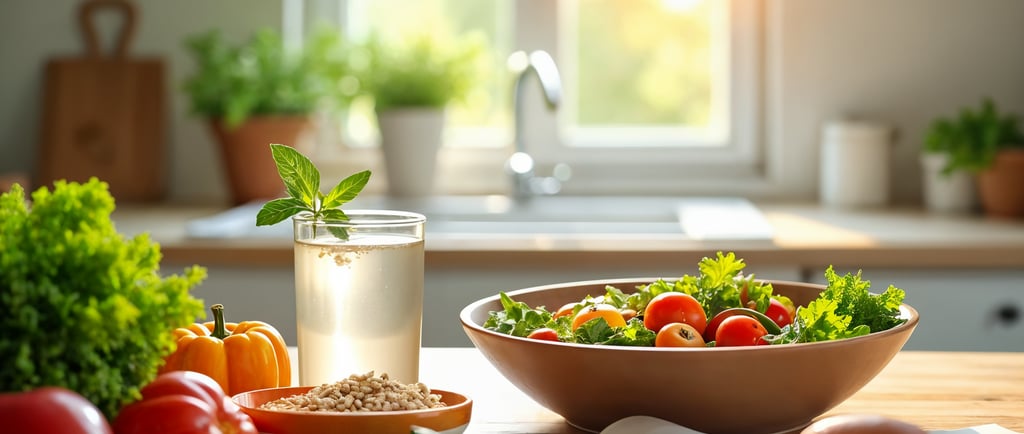Piles-Friendly Diet: Essential Tips for Hemorrhoid Relief
Discover effective dietary strategies for piles patients. Learn about fiber-rich foods, hydration tips, and meal planning to alleviate hemorrhoid symptoms and promote digestive health.


Understanding Piles and the Importance of Diet
Understanding how diet affects piles, or hemorrhoids, is vital for those seeking relief from this uncomfortable condition. A well-planned diet can significantly ease symptoms and promote better digestive health. The main focus should be on increasing fiber intake, which is crucial for softening stools and making bowel movements easier. According to a study on diet and hemorrhoids, both soluble and insoluble fiber are important for reducing inflammation in the colon and improving stool bulk. This dietary change can help prevent the straining that often worsens hemorrhoid symptoms.
Key Dietary Components for Piles Patients
Fiber-Rich Foods: Aim for 20-30 grams of fiber daily. Good sources include:
Whole grains (e.g., oats, brown rice)
Fruits (especially prunes, berries, and apples)
Vegetables (like broccoli, Brussels sprouts, and carrots)
Legumes (beans, lentils, and peas)
Hydration: Drinking plenty of water is equally important. Staying well-hydrated helps soften stools, making them easier to pass and reducing the risk of straining during bowel movements. Experts recommend consuming at least eight glasses of water daily to support fiber's effectiveness in the diet.
Probiotics: Including probiotic-rich foods, such as yogurt and fermented vegetables, can improve gut health and digestion, further aiding in the management of piles.
Foods to Avoid
While some foods can help ease symptoms, others can make the condition worse. It is advisable to limit or avoid:
Spicy foods
Dairy products
Processed foods
Foods high in fat and low in fiber, such as red meat and white flour products
These foods can irritate the intestines and worsen hemorrhoid symptoms, making it essential to be mindful of dietary choices.
Meal Planning Strategies
Effective meal planning can significantly reduce daily stress related to food choices and enhance your culinary experience. By organizing meals ahead of time, individuals can make healthier choices, save time, and reduce food waste. Key strategies include:
Creating a weekly meal plan that emphasizes fiber-rich foods
Utilizing grocery lists to avoid impulse purchases
Incorporating batch cooking to prepare meals in advance, ensuring healthy options are readily available.
In conclusion, adopting a diet for piles patients that prioritizes fiber, hydration, and mindful food choices can lead to significant improvements in symptoms and overall digestive health. By understanding the impact of diet on hemorrhoids, individuals can take proactive steps towards managing their condition effectively.
Fiber-Rich Foods: The Foundation of a Piles-Friendly Diet
Fiber is a crucial part of a diet for piles patients, as it helps prevent and manage hemorrhoids. Increasing both soluble and insoluble fiber in the diet can reduce inflammation in the colon, improve stool bulk, and regularize bowel movements, which are essential for alleviating the discomfort associated with piles. According to a study on diet and hemorrhoids, effective meal planning that emphasizes fiber-rich foods can significantly enhance digestive health and reduce the risk of flare-ups.
Key Fiber-Rich Foods
To create a diet for piles patients, it is essential to include a variety of fiber-rich foods. Here are some excellent sources:
Whole Grains: Foods like oats, brown rice, and whole grain bread are high in fiber and can help maintain regular bowel movements.
Fruits: Berries, apples, and pears are not only delicious but also packed with fiber. Prunes, in particular, are well-known for their natural laxative effect, making them a great choice for those suffering from hemorrhoids.
Vegetables: Leafy greens such as spinach and kale, along with cruciferous vegetables like broccoli and Brussels sprouts, provide both fiber and essential nutrients.
Legumes: Beans, lentils, and chickpeas are excellent sources of fiber and can be easily incorporated into various dishes.
Importance of Hydration
In addition to fiber, staying well-hydrated is vital for a diet for piles patients. Adequate water intake helps soften stools, making them easier to pass and reducing the strain during bowel movements. The hemorrhoids diet plan recommends drinking at least eight glasses of water daily to support fiber's effectiveness in the digestive system.
Foods to Avoid
While focusing on fiber-rich foods, it is equally important to avoid certain items that can exacerbate hemorrhoid symptoms. Spicy foods, high-fat dairy products, and processed foods should be limited, as they can irritate the intestines and worsen discomfort. The hemorrhoid diet emphasizes steering clear of these foods to maintain optimal digestive health.
Spicy Foods: Spices can irritate the digestive tract, leading to increased discomfort and inflammation. Foods like hot peppers, spicy sauces, and heavily seasoned dishes should be limited or avoided altogether.
Dairy Products: High-fat dairy products, such as whole milk, cheese, and ice cream, can contribute to constipation, which is a significant factor in the development of hemorrhoids.
Processed Foods: Foods high in refined sugars and unhealthy fats, such as fast food, chips, and sugary snacks, can lead to digestive issues. These foods often lack the necessary fiber that helps maintain regular bowel movements.
Red Meat: High in fat and low in fiber, red meat can slow down digestion and contribute to constipation. Opting for lean proteins, such as chicken or fish, can be a healthier choice.
Caffeine and Alcohol: Both caffeine and alcohol can lead to dehydration, which can harden stools and make them more difficult to pass. Staying hydrated is essential for maintaining soft stools.
Conclusion
Incorporating fiber-rich foods into your diet is a foundational step in managing piles effectively. By prioritizing whole grains, fruits, vegetables, and legumes, while ensuring proper hydration, you can significantly alleviate symptoms and improve your overall digestive health.
